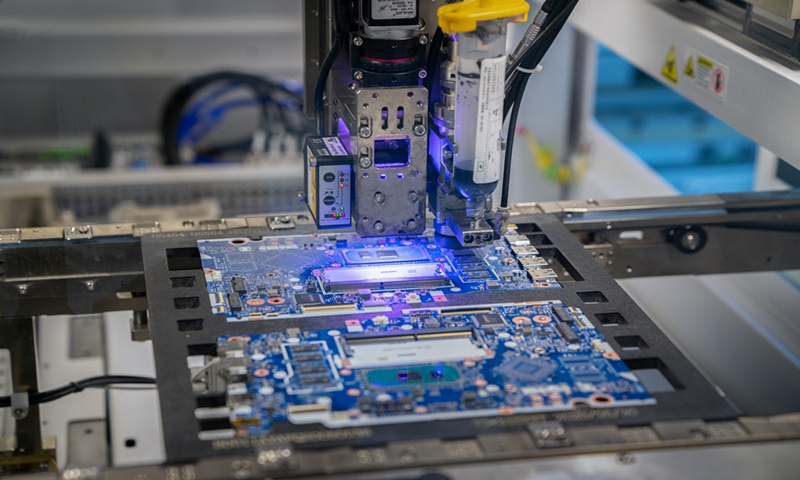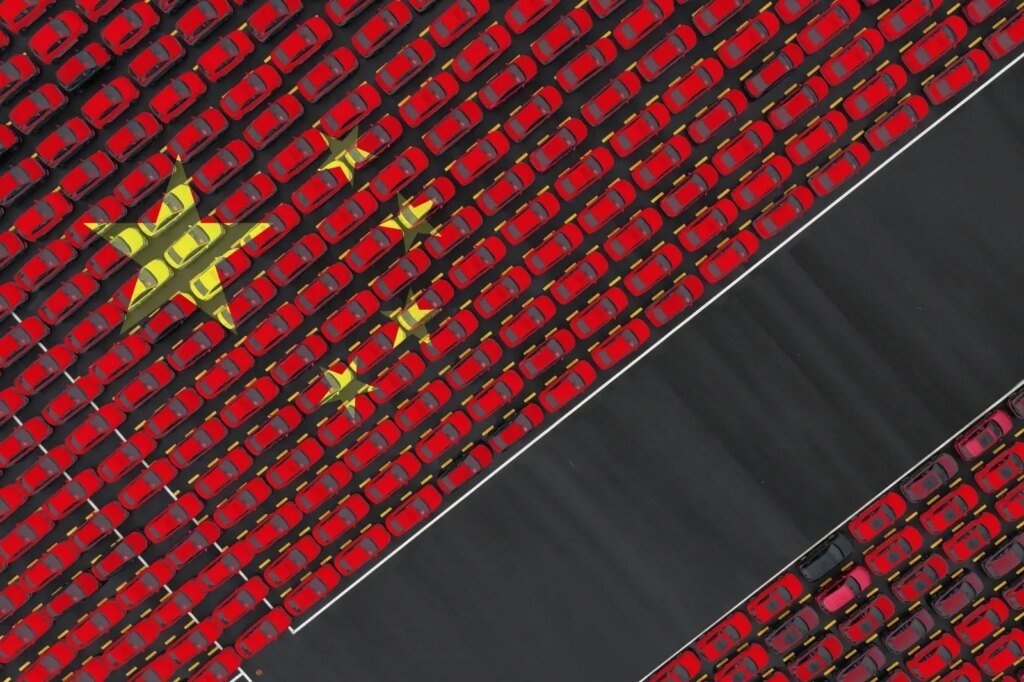
A chip manufacture machine Photo: VCG
The Chinese Ministry of Commerce (MOFCOM) said on Thursday that it has received reports from domestic companies of concerns over unfair subsidies the Biden administration is giving to US chipmakers, and said that Chinese investigating authorities will review them in accordance with relevant Chinese laws and regulations, and could follow World Trade Organization rules, initiating investigations as required by law.
In response to a media inquiry about whether the ministry has received application requests for anti-dumping and anti-subsidy probes from domestic legacy chips industries, as they are reportedly suffering from unfair competition from imported products from the US, a MOFCOM spokesperson said domestic chip industries have reported concerns about the Biden administration offering substantial subsidies to the US chip sector, giving American companies an unfair competitive advantage.
They claimed that these companies are exporting legacy chip products to China at “low prices,” undermining the legitimate rights and interests of China’s domestic industries, the MOFCOM spokesperson said. “The concerns raised by Chinese domestic industries are reasonable, and they have the right to file applications for trade remedy investigations.”
I would like to emphasize that for applications and appeals from domestic industries, the investigating authorities will review them in accordance with relevant Chinese laws and regulations, and could follow WTO rules to initiate investigations as required by law, the spokesperson noted.
The move is “one of Beijing’s strongest retaliatory moves so far against American technology sanctions,” according to Bloomberg on Thursday.
Chinese experts said on Thursday that in the face of mounting technology sanctions from the US, recently rolled out by the Biden administration in an irresponsible manner, the country will not hesitate to take measures to defend its lawful rights and interests.
A number of Chinese industry associations related to semiconductor manufacturing also voiced their support for MOFCOM’s stance.
The China Semiconductor Industry Association (CSIA) said on Thursday that it firmly supports both domestic and foreign semiconductor companies operating in China in actively protecting their legitimate rights and interests in accordance with WTO rules.
The China Chamber of Commerce for Import and Export of Machinery and Electronic Products said on Thursday that it firmly supports the Chinese chip industry and chip firms using WTO rules to defend their legitimate rights and interests.
In August 2022, the Biden administration officially signed the CHIPS and Science Act, pledging up to $280 billion in subsidies, loan guarantees, and tax incentives to vigorously support the expansion of semiconductor manufacturing capacity in the US.
Ma Jihua, a senior industry analyst, told the Global Times on Thursday that a probe into US mature node chips would be a normal action based on the market dynamics and will adeptly address the situation of some US chip companies halting sales of advanced chips while simultaneously dumping legacy chips onto the Chinese market.
“As years of US containment of China’s chip industry largely failed and China’s homegrown mature node chips seeing rapid growth in recent years, China now knows how things stand and feels confident if it does start such a probe, as it can use its own chips,” Ma said.
Strong opposition
In recent days, China has voiced strong objection against mounting and intensive sanctions by the outgoing Biden administration aimed at cracking down on China’s tech industry, including artificial intelligence (AI) chips, connected vehicle supply chains and drones, under the guise of protecting national security.
What the US does is typical economic coercion and bullying. China deplores it and firmly opposes it, said Chinese Foreign Ministry spokesperson Guo Jiakun, in response to a question about the US announced further export controls yesterday on advanced computing semiconductors, increasing due diligence requirements for businesses.
“I want to stress that no sanction or suppression will stop China’s development and progress, and no bullying or coercion will weaken China’s resolve in boosting its own strengths. We will take resolute measures to firmly safeguard the legitimate and lawful rights and interests of Chinese companies and individuals and our country’s sovereignty, security, and development interests,” Guo said.
In December, a number of Chinese industrial associations including the CSIA have urged domestic firms to exercise caution when purchasing US chips as US curbs on China have caused disruptions in the supply chain of US companies, affecting their reliability.
A forced rush
“The actions of the Biden administration can be seen as a final rush, cramming all the initiatives it deemed necessary into the closing months. The decisions were made with little communication with US businesses,” Song Guoyou, a deputy director of the Center for American Studies at Fudan University, told the Global Times on Thursday.
Considering the fact that Biden is about to leave the White House, these newly ushered policies were effectively imposed on the incoming Trump administration during the transitional period, Song said.
“In a sense, Biden’s team seems to be worried that the next administration won’t follow their policies, and has thus resorted to a forced approach. This has not only pressured US businesses but also put pressure on the future Trump administration,” Song added.
The latest actions revealed that the US is continuing to abuse its overall dominant position to place curbs on China and contain its development, Gao Lingyun, an expert at the Chinese Academy of Social Sciences in Beijing, told the Global Times on Thursday.
Gao said China’s reactions to the US crackdown will be based on the two countries’ overall competition and will maintain strategic focus and zoom in on improving its competitiveness in the tech arena.
The irresponsible actions by the Biden administration have drawn vocal criticism from within the US.
US-based chip manufacturer Nvidia said in a statement posted on its website on Monday that the Biden administration’s new AI chip rule is unprecedented and misguided, and threatens to derail innovation and economic growth worldwide.
Rather than mitigate any threat, the new Biden rules will only weaken America’s global competitiveness, undermining the innovation that has kept the US ahead, the company noted.
On January 5, Ken Glueck, executive vice president of Oracle, wrote a blog post saying that the Biden administration’s AI chip rule will go down as one of the most destructive to ever hit the US technology industry.
“Worse, without fully contemplating the rule’s effects, we are likely handing most of the global AI and GPU market to our Chinese competitors,” Glueck noted.
On Wednesday, in a document shared with the Global Times, the US Consumer Technology Association expressed concerns to the US Department of Commerce about the potential increased costs and other impacts of the Biden administration’s restrictions on Chinese software and hardware used in US vehicles.
The policies of the US government have created major uncertainties for US companies, leading to growing opposition from many businesses, Song said.
A MOFCOM spokesperson also said on Thursday that the country will, in due course and in accordance with the law, include dual-use items in strategic resources and enhance export controls based on its own needs to safeguard national security, while fully considering international practices and better fulfilling its non-proliferation obligations.
The comment was made in response to a question about whether MOFCOM will add dual-use items in the area of strategic resources and strengthen export controls.







